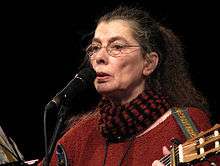Bettina Wegner

Bettina Wegner (born 4 November 1947 in West-Berlin) is a German singer-songwriter. She is best known for her song "Sind so kleine Hände", written as "Kinder (Children)",[1] also sung by Joan Baez, Dean Reed and others.
Biography
Wegner was born in Berlin. After the creation of the East Germany (GDR) her communist family moved to East Berlin. Her critical songs caused problems with the authorities and eventually led to her expulsion to West Germany in 1983.
She first learnt the profession of a librarian. In 1966 she began to study drama at the Ernst Busch Academy of Dramatic Arts in Berlin and was also the co-founder of the East-Berlin Hootenanny-Klub. The idea of such Clubs were that everybody could present his/her own lyrics and writings without censorship on the stage. This freedom didn't last long, within one year this principle was abandoned, the Hootenanny-Klub was named Oktoberclub and became insinuated in the official youth organization in the German Democratic Republic, East Germany.
After writing and spreading pamphlets against the intervention of the Warsaw Pact States in Czechoslovakia (Prague Spring) in 1968 she was exmatriculated and arrested because of anti-state activities. She was sent to prison for 19 month on parole. The experience of censorhsip and of custody (her first child from Thomas Brasch was recently born) influenced her conduct and most of all the lyrics of her songs. After the „probation in the production“ (which means obliged work in a factory in the former GDR) she visited nightschool, finished the A level and completed 1972 her training as singer at the 'Zentrales Studio für Unterhaltungskunst'. Since then she is living as a singer-songwriter.
Events (like "Eintopp" and "Kramladen") together with her husband Klaus Schlesinger (journalist) with whom she was married from 1970 till 1982, were forbidden by the GDR government agencies. After she also protested publicly against the deprivation of the singer-songwriter Wolf Biermann in 1976 her own performances were on and on cut back. The Stasi spy on her and put her under pressure permitted by the penal code § 106 of the GDR to spy on „adverserial – negative“ persons.[2] Her former manager, Katharina Harich, who was also the manager of the humoristic songgroup MTS, made some performances for her possible as insiders tip. On the preannouncemtents stood „ MTS and singer“. Also Werner Sellhorn, helped with a program that sounded pretty harmless like „Kurt Tucholsky and Songs of today“. The concerts were jammed, - the news that Bettina Wegner would sing, passed on from person to person. This worked in the GDR always very efficient and smoothly when it was about forbidden music and literature. She than was also still able to give concerts in some churches, for example in the Samariterkirche in East Berlin which was known for its oppositional events.
In 1978 she suddenly became also known in West-Germany via a television broadcast named „Kennzeichen D“ of Dirk Sager. It opened for her the chance to publish her first long-playing record (at CBS) which was an audio recording of a concert in the artist residence Bethanien. The first studio recording at CBS was accompanied by musicians of the rockband Nervous Germans. All this opened up a lot of new perspectives which would never have been possible in the GDR. Employment ban in her own country, but permitted to travel to concerts in West-Germany, Austria and Belgium because she was a foreign currency earner for the GDR. But this was only a method of the GDR to get rid of well known but opponent artists: in 1983 the GDR instituted proceedings against Bettina Wegner because of the suspicion of „foreing currency and duty misdemeneaours“. The GDR gave her the choice whether she go to jail or will agree with a deprivation. She left the GDR towards West-Berlin. The loss of her homeland and the loss of her communist ideals were becoming the most important subjects of her songs in the 80ies than. As a singer she also performed with international singers as Joan Baez, Konstantin Wecker, Angelo Branduardi. She developed impulses she got out of the performances with Wecker together with the guitarplayer Peter Meier. Peter Meier was from 1985 until 1992 her musical companion and arranger. He also composed some of the music for lyrics of her like 'Das Lied vom Messer', 'Waffenlos', 'Der Prinz ist gegangen' and 'Sie hat's gewußt'. Since 1992 she gave regularly sold out concerts with her new music-trio L'art de passage and especially with Karsten Troyke. 1996 she got as first laureate the Thüringer Kleinkunstpreis in Meinigen for her program „Sie hat's gewußt“ ( She knew it ). She published several CDs but wasn't any more present in television and radio.

After 30 years of concert tours and music publishing she said temporary Good Bye to her public in 2007 with a Good-Bye-Tour. The causes were health issues but not only: „ It was a real haggeling as if you are an ageing hooker. Of course I have my price (…) I like to stop here, singer ain't my profession anymore ... even when I will sing by now and than for benefit or special occasions for example (...)“ [3]
Bettina Wegner has three children.
References
- ↑ Discography at discogs
- ↑ Joachim Walther: Sicherungsbereich Literatur. Links-Verlag, 1998, S. 371
- ↑ Berliner Zeitung vom 27. Januar 2007: Das letzte Lied
External links
|